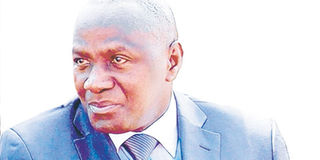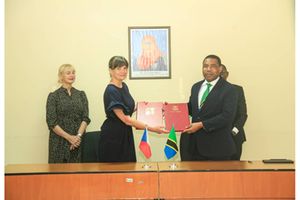The lawmaker who lives in fear

MP in the East African Legislative Assembly, Burundi’s Jeremie Ngendakumana is concerned over the crisis in his country. His colleague Hafsa Mossi was assassinated a fortnight ago.
PHOTO|FILE
What you need to know:
- But he is much worried by the deep crisis in his homeland which has reduced him to a refugee within the region. He says he has not been to Burundi since the end of last year.
- Perhaps July 12th - only about three weeks ago - was the day the Burundi politician found himself in the midst of worries which have haunted him for nearly two years.
Arusha. Jeremie Ngendakumana, a Burundi member of the East African Legislative Assembly (Eala), looks a scared man these days. He is not only concerned about his tenure as a member of the regional Assembly after the government of President Pierre Nkurunziza threatened to withdraw his membership to the House.
But he is much worried by the deep crisis in his homeland which has reduced him to a refugee within the region. He says he has not been to Burundi since the end of last year.
Perhaps July 12th - only about three weeks ago - was the day the Burundi politician found himself in the midst of worries which have haunted him for nearly two years.
He happened to be in Arusha and around mid-day he was counting steps along the long corridors and stairs of the headquarters of the East African Community (EAC).
Officials at the secretariat as well as those at Eala may have noticed that the famous politician of the strife-torn country was not in a place he was supposed to be, at least on that day. At the Arusha International Conference Centre (AICC), a block away from the Community seat, the Burundi peace talks under the former president Benjamin Mkapa were underway. “I am aware of the talks but I have not been invited,” he told the Political Platform when asked whether he knew something on the on-going Inter-Burundi Dialogue in the vicinity.
Nonetheless, he said despite his absence in the meeting halls, he was aware of what transpired in the meeting rooms in the second phase of the dialogue, which, as expected, had a shaky start.
He was explicit his main concern was not about the faltering talks but the situation at home where killings continue, especially in the Bujumbura capital.
A senior EAC official around challenged him, claiming there had been a decline of killings reported from Burundi, implying some kind of normalcy.
It was at that time that the MP, who once served as the chairman of the ruling CNDD-FDD party of president Nkurunziza, became agitated. “In Bujumbura it is very common for people to enjoy themselves in a bar, while scores of others are gunned down in the next street,” he said.
And he took swipe at the executives of the EAC, the very organisation his fellow Burundians elected to represent them in.
He accused the regional organization and, of course, the government currently in power in Bujumbura for painting a rosy picture of the nation, he claims, was bleeding with unending killings.
“It is true you don’t hear of much street protests in the capital as was the case last year. But extra-judicial killings of targeted people continue to this day”, he affirmed.
Ngendakumana confirmed that was the reason why he had not stepped foot on his country since around November or December last year for fear of his life.
Three other Eala MPs from Burundi; Dr. Martin Nduwimana (from Uprona party), Frederic Ngenzebuhoro (also Uprona) and Yves Nsabimana from Frodebu are also reported to be avoiding their home country after the government informed Eala Speaker in November 2015 that it was withdrawing their membership on grounds that they were fighting the government in power.
Mr Ngendakumana had not finished talking at the EAC headquarters when reports filtered in of disagreements among warring parties at Inter-Burundi Dialogue talks at the adjacent AICC.
The Burundi government representatives, who included cabinet ministers, vowed not to sit on a negotiating table with politicians it accuses of being behind the mayhem in their country which has claimed over 500 lives since April last year.
Among those singled out were Dr.Jean Minani from a coalition based in diaspora called CNARED, Pacifique Nininahazwe from Focode and Armel Niyongere of ACT-Burundi.
In fact, the outspoken minister for External Affairs Allen Nyamitwe who alleged that instead of being invited to Arusha for the Dialogue,Dr. Minani, Mr Nininahazwe and Nyongere should be arrested, locked up and charged for treason.
How could the scared Ngendakumana felt less than 24 hours later (July 13th) when his fellow legislator Hafsa Mossi from Burundi was gunned right in the capital outside her home by unknown assailants?
The shock killing may have looked like a kind of movie. It took place right at the time scores of Burundi politicians and other officials in were focused on how to remove hurdles blocking efforts to bring peace there.
Although some were in the holed up in the meeting rooms while others were aside communicating with their counterparts on their cell phones. Yet some of them, including representatives of various political parties, were canvassing in the lobby room when TV screens painted red with the sad news, some minutes past 1 pm.
Many of them were devastated and left the AICC in a huff. Others took time to discuss the tragedy, knowing too well that the incident cannot be separated with the dialogue going on in Arusha and which had seen widening cracks among the Burundians.
Shock gripped the EAC headquarters almost immediately, with many staff members of the EAC and Eala rendered into grief by what they described as cowardly and barbaric act which took the life of one of the strong advocates of regional integration.
“She was hardworking member of the Assembly who was committed to the ideals of integration,” said the Speaker of the Assembly Mr Daniel Kidega as he eulogised the fallen legislator.
Eala called for independent investigations to unearth the killers of the broadcaster-turned-politician who prior to joining Eala was a minister in President Pierre Nkurunziza’s government.
However, most MPs said the shock killing of Ms Mossi in Bujumbura by unidentified gunmen, mirrored the violence which rocked Burundi since April last year in which over 500 have died, mostly in the capital city.
It was in that context that the Assembly called on the EAC Heads of State to seriously intervene in the Burundi political turmoil by ensuring all warring parties took part in the on-going mediation in the strife-torn member of the bloc.
A Resolution moved by Eala Chair of the Committee on Legal, Rules and Privileges Peter Mathuki said the brutal killings and violence in Burundi can only come to an end once security and stability is restored there in the shortest possible time.
“The use of political assassinations or murder as a tool to settle political differences was not only myopic, cowardly and despicable but has not place in the political dispensation of the modern world of democracy, freedom of expression and association,” the Resolution further said.
Burundi minister for EAC Afffairs Ms Leontine Nzeyimana was on the point of shedding tears when she assured the House that the government at home was investigating killing and appealed to the Assembly not to isolate the troubled country.
That was the same argument the fallen legislator had advocated for some months prior to her death. During the Eala sessions which discussed the Burundi crisis early this year, she had repeatedly castigated those calling for economic sanctions against her country, maintaining that Burundi’s political crisis cannot be resolved through sanctions.
“We cannot attain a meaningful solution by imposing sanctions,” she said, always in defence of president Nkurunziza’s government and reconciliation among different groups of the political divide.




